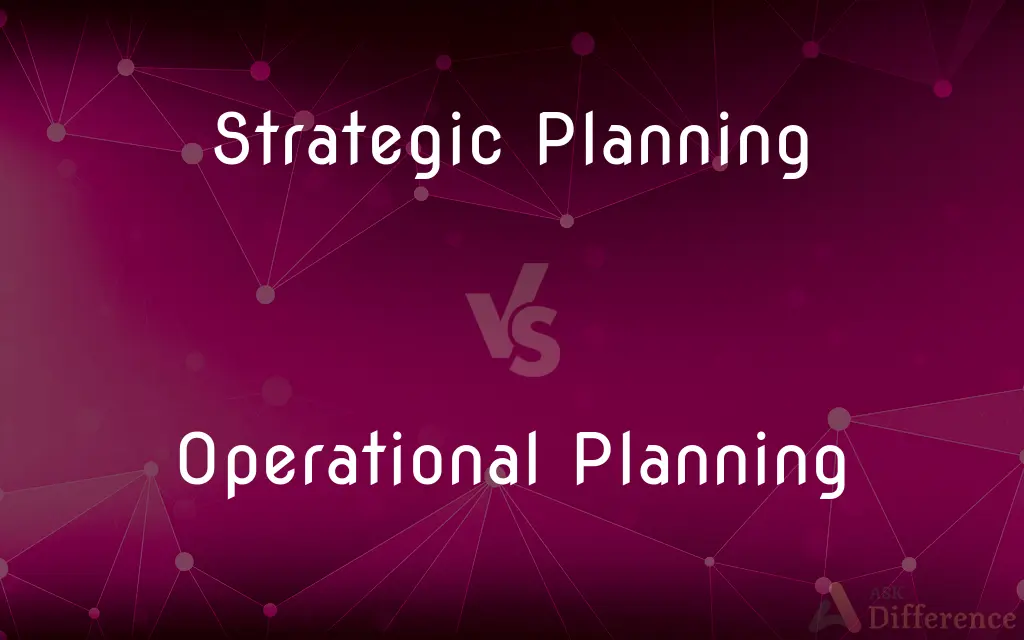Strategic Planning vs. Operational Planning — What's the Difference?
By Tayyaba Rehman — Published on October 25, 2023
Strategic Planning outlines long-term goals and direction; Operational Planning details short-term actions to achieve them.

Difference Between Strategic Planning and Operational Planning
Table of Contents
ADVERTISEMENT
Key Differences
Strategic Planning is a process that establishes an organization's long-term vision, mission, and objectives. This form of planning is about defining where the organization wants to be in the future. Operational Planning, on the other hand, delves into the specifics of how to achieve that vision, detailing the daily tasks, responsibilities, and short-term actions needed.
Strategic Planning focuses on the broader picture, identifying key milestones, opportunities, and potential challenges over a longer timeframe. It's often about setting a direction and defining what success looks like. Operational Planning breaks those milestones down into actionable steps, allocating resources, and setting timelines to ensure that strategic goals are met.
Strategic Planning typically involves higher management levels because it sets the course for the entire organization. This planning is more conceptual, based on analysis, insights, and forecasts. Operational Planning often involves middle and lower management, as it revolves around execution, ensuring that every department or team is aligned with the strategic goals.
While Strategic Planning may take a more abstract approach, considering external factors like market trends and competitor moves, Operational Planning is far more concrete. It considers internal factors, such as team capabilities, resources, and immediate priorities, to bring the strategic vision to life.
In essence, while Strategic Planning gives an organization its direction, Operational Planning defines the path and the steps to get there, ensuring the organization stays on course and meets its overarching objectives.
ADVERTISEMENT
Comparison Chart
Timeframe
Long-term
Short-term
Focus
Vision, mission, objectives
Daily tasks, responsibilities
Involved Parties
Higher management
Middle and lower management
Nature
Conceptual, analytical
Concrete, execution-focused
Considered Factors
External (market trends)
Internal (resources, teams)
Compare with Definitions
Strategic Planning
Strategic Planning involves higher management in decision-making.
The CEO took an active role in the Strategic Planning process to align the company's direction.
Operational Planning
Operational Planning involves detailing daily tasks and responsibilities.
Through meticulous Operational Planning, they streamlined their production process.
Strategic Planning
Strategic Planning is defining an organization's long-term vision and goals.
Through Strategic Planning, they envisioned becoming the industry leader in five years.
Operational Planning
Operational Planning focuses on resource allocation and timelines.
Operational Planning sessions determined the budget allocations for each project.
Strategic Planning
Strategic Planning determines an organization's overarching direction.
Strategic Planning sessions highlighted the importance of digital transformation.
Operational Planning
Operational Planning aligns teams with strategic objectives.
Operational Planning meetings ensured marketing and sales were on the same page.
Strategic Planning
Strategic Planning sets key milestones for future growth.
Their Strategic Planning phase established a roadmap for expanding overseas.
Operational Planning
Operational Planning breaks down strategic goals into actionable steps.
Operational Planning ensured that every department had clear quarterly targets.
Strategic Planning
Strategic Planning considers external factors and market trends.
Strategic Planning helped them foresee potential challenges from emerging competitors.
Operational Planning
Operational Planning revolves around execution and immediate priorities.
The team's Operational Planning addressed the immediate needs for the product launch.
Common Curiosities
How does Strategic Planning differ from Operational Planning?
Strategic Planning outlines long-term goals, while Operational Planning details actions to achieve those goals short-term.
Is Strategic Planning more important than Operational Planning?
Both are crucial; Strategic Planning sets the direction, and Operational Planning ensures its execution.
Who typically engages in Strategic Planning?
Higher management usually takes part in Strategic Planning to set the organization's direction.
Can a company succeed with just Strategic Planning?
Strategic Planning sets the vision, but without Operational Planning to execute, achieving goals becomes challenging.
Do all organizations need Strategic Planning?
While specific processes may vary, all organizations benefit from Strategic Planning for long-term success.
What are the key elements of Operational Planning?
Operational Planning includes tasks, responsibilities, resource allocation, and timelines.
What is Strategic Planning?
Strategic Planning defines an organization's long-term vision, mission, and objectives.
How often should Operational Planning be done?
Operational Planning is typically done annually but can be reviewed quarterly or monthly based on needs.
Why is Operational Planning essential after Strategic Planning?
Operational Planning translates strategic goals into actionable steps, ensuring effective execution.
How detailed should Operational Planning be?
Operational Planning should be detailed enough to guide teams clearly but flexible for unforeseen changes.
What tools assist in Operational Planning?
Project management software, resource allocation tools, and timeline planners aid in Operational Planning.
Do startups need Strategic Planning or just Operational Planning?
Startups benefit from both; Strategic Planning sets the vision, and Operational Planning helps in immediate execution.
How do companies ensure alignment between Strategic and Operational Planning?
Regular communication, reviews, and alignment sessions ensure both plans work cohesively.
Can a company update its Strategic Planning regularly?
Yes, revisiting and updating Strategic Planning in response to changes or new insights is beneficial.
Can Operational Planning influence Strategic Planning?
Yes, insights from Operational Planning can refine and inform future Strategic Planning phases.
Share Your Discovery

Previous Comparison
Rosewood vs. Redwood
Next Comparison
Benzene vs. BenzoateAuthor Spotlight
Written by
Tayyaba RehmanTayyaba Rehman is a distinguished writer, currently serving as a primary contributor to askdifference.com. As a researcher in semantics and etymology, Tayyaba's passion for the complexity of languages and their distinctions has found a perfect home on the platform. Tayyaba delves into the intricacies of language, distinguishing between commonly confused words and phrases, thereby providing clarity for readers worldwide.















































